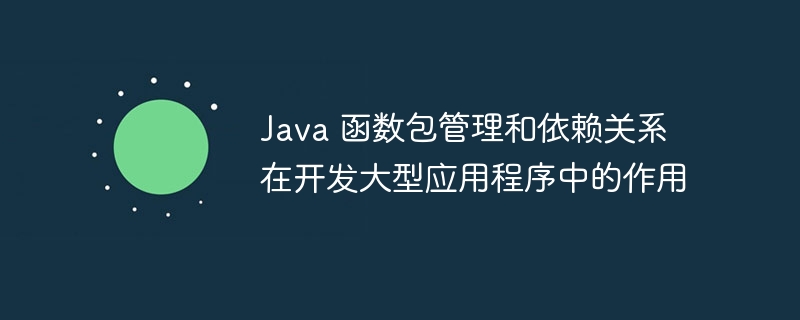Home >Java >javaTutorial >The role of Java package management and dependencies in developing large applications
The role of Java package management and dependencies in developing large applications
- PHPzOriginal
- 2024-04-24 16:03:02902browse
The role of package management and dependency management in Java in the development of large-scale applications. In the development of large-scale applications, package management and dependency management are crucial. They simplify code distribution, version management, and dependency resolution. relationship conflicts and improve application reliability, maintainability, and productivity. Benefits of function package management: Code reuse Dependency version management Updates Advantages of automated dependency management: Conflict resolution Version range specification Automatic import

Java Function Package Management and the role of dependencies in large-scale application development
Introduction
In large-scale application development, organizing and managing the code base becomes crucial . Package management and dependency management systems enable developers to efficiently distribute code, manage versions, and resolve dependency issues. This article will explore the importance of function package management and dependency management in Java, and illustrate it through practical cases.
Package Management
Package managers simplify code distribution by providing a repository or repository for storing and retrieving pre-built code components. Common Java package managers include Maven and Gradle. Package management provides the following benefits:
- Code Reuse:Reusable code can be packaged into packages and shared across multiple applications.
- Dependency version management: The function package management system tracks and manages function package dependency versions to avoid conflicts.
- Update automation: The package manager can automatically check for and apply package updates.
Dependency Management
Java applications often rely on external libraries and function packages to run effectively. Dependency management systems (such as Maven and Gradle) enable developers to declare and manage these dependencies, providing the following benefits:
- Conflict resolution: The dependency management system will identify And resolve dependency conflicts between different function package versions.
- Version range: Developers can specify the specific version range allowed by dependencies to ensure compatibility.
- Automatic import: Dependencies can be automatically imported into the project by declaring them in the build configuration.
Practical case
Use Maven for function package management
<dependencies>
<dependency>
<groupId>org.apache.commons</groupId>
<artifactId>commons-lang3</artifactId>
<version>3.12.0</version>
</dependency>
</dependencies>Use Gradle for dependencies Management
dependencies {
compile group: 'org.apache.commons', name: 'commons-lang3', version: '3.12.0'
}Conclusion
Java package management and dependency management are valuable tools in the development of large applications. They simplify the development and maintenance process by providing code distribution, dependency management, and version control capabilities. By properly leveraging these systems, developers can improve the reliability, maintainability, and productivity of their applications.
The above is the detailed content of The role of Java package management and dependencies in developing large applications. For more information, please follow other related articles on the PHP Chinese website!

